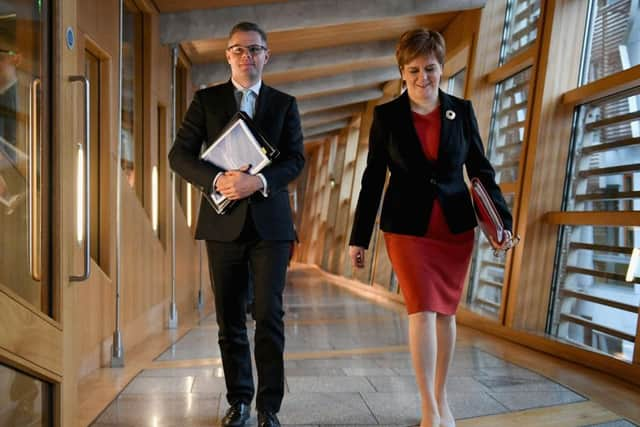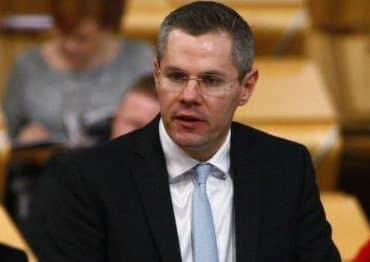Scottish Budget 2017: Income tax to be increased
Mr Mackay announced the creation of two new tax bands - an “intermediate” band and a “starter band” - which split the old basic band into three.
Under his plans, the rate of income tax paid in the intermediate band - from £24,000 to £44,273 - would be increased from 20 per cent to 21 per cent.
Advertisement
Hide AdAdvertisement
Hide AdHe also announced an extra penny for those in the higher band (those earning between £44,273 to £150,00) with an increase in the rate from 40 per cent to 41 per cent.


Similarly, the rate paid by the top earners (those with salaries above £150,000) will be increased from 45 per cent to 46 per cent in 2018/19.
New ‘starter’ band
At the other end of the pay scale, Mr Mackay introduced an income tax cut by creating a new “starter” income tax band between £11,850 and £13,850.


In the starter band income tax a penny would be taken off income tax with the rate being reduced from 20 per cent to 19 per cent.
The basic rate would remain at 20 per cent, but the creation of the intermediate and starter bands would see it narrowed from £11,850- £44,273 to £13,850- £24,000.
When the cut for the low paid was combined with increases in the tax free personal allowance announced by Chancellor Philip Hammond in the UK budget are taken into account, Mr Mackay said nobody in Scotland earning less than £33,000 will pay more income tax in 2018/19 than they do this year.
But the increased tax that will be paid by those earning more than £33,000 was condemned by the Scottish Tories, who claimed Mr Mackay had broken a SNP manifesto pledge not to raise basic income tax.


Mr Mackay also announced that first time house buyers would be excused Land and Buildings Transaction Tax on properties up to the value of £175,000.
Advertisement
Hide AdAdvertisement
Hide AdHe also indicated private schools would have to pay millions of pounds more in business rates after axing the relief they currently enjoy as a result of their charitable status.
Mr Mackay said the tax reform would raise an additional £164 million.


Those earning £33,000 or more will pay more income tax next year than they did this year, while those earning £26,000 or more will next year pay more income tax than someone on the same salary south of the border.
According to the Scottish Government, 55 per cent of taxpayers earned less than £26,000 leading to Mr Mackay claiming the majority of Scottish workers would be paying less than those elsewhere in the UK.
What it means for taxpayers
Around 70 per cent of Scotland’s 2.5 million taxpayers earn less than £33,000.
That leaves around three quarters of a million working Scots paying more tax next year than they did this year.
While more than one million will pay more than their equivalents in the rest of the UK.
Someone earning £35,000 will end up paying £90 more than an individual on the same money south of the border.
Advertisement
Hide AdAdvertisement
Hide AdThose on a £40,000 salary will end up paying £140 more their equivalents elsewhere in the UK.
Those Scots earning £50,000 will pay £240 more than they do currently and £655 more than those on the same salary south of the border.
Those on £75,000 would end up paying £490 more next year than they do currently and £905 more than someone on the same salary elsewhere in the UK.
While workers on £15,000 would only be £20 better off next year as a result of the one penny cut in the starter band.
Shadow Finance Secretary Murdo Fraser said: “This Nat Tax will hit nearly half of Scottish workers in the pocket. That is a tax on aspiration, a punishment for daring to work hard, and a direct breach of the promise made by the SNP in its election manifesto.
“Today, every single SNP member of the Scottish Government has broken that promise to the Scottish people.
“That will not escape the notice of voters, who will never believe a word the nationalists say again.
“The message from this budget is clear: don’t be ambitious, don’t be hard working, and don’t be successful in the SNP’s Scotland.
Advertisement
Hide AdAdvertisement
Hide Ad“If you are, the SNP will penalise you for its own failure to grow the economy.”
Mr Mackay said: “ This new ‘Starter’ Rate, combined with the increase in the personal allowance, will ensure that no-one earning less than £33,000 - which is 70% of all taxpayers - will pay any more in tax than they do now for given incomes.
On the contrary, everyone earning below £33,000 will pay slightly less tax in the coming year than they do this year.
The introduction of the new ‘Starter’ rate will also mean that those earning up to £26,000 - which is 55% of all taxpayers in Scotland - will pay marginally less tax than they would if they lived elsewhere in the UK.”
Brexit Challenge
At the start of his statement Mr Mackay stressed the financial challenges that will arise from both Brexit and the declining number of Scots of working age.
To address this he pledged the Scottish Government would “continue to make the case for a common sense solution to Brexit that keeps Scotland and the UK in the single market and customs union.”
Mr Mackay announced plans to increase the Economy, Jobs and Fair Work portfolio funding by £270 million, 64 per cent.
He said the increased investment contributes to almost £2.4 billion for enterprise and skills agencies, and includes a 70 per cent increase in funding for business research and investment to £37 million.
Advertisement
Hide AdAdvertisement
Hide AdThe plan also doubles the funding to City Region Deals to £122 million.
Further investment
Around £1.8 billion will be invested in colleges and universities, representing a real terms increase in their funding.
An initial £18 million has been allocated for the new manufacturing institute announced by Ms Sturgeon on Monday.
A further £60 million will go to a low carbon innovation fund to support the transition to a low carbon economy, with £1.2 billion to be invested in transport infrastructure and £20 million for electric vehicles.
A total of £4 billion will be invested in infrastructure spending in Scotland - with the Finance Secretary saying this was part of £20 billion of spending over the lifetime of the parliament.
And he said this included the “first steps toward one of the most significant infrastructure projects of this Parliament - superfast broadband for the whole of Scotland”.
This commitment is “unmatched anywhere in the UK”, he said.
Mr Mackay announced £10 million for a new screen unit and funding to protect arts and culture.
More to follow.
